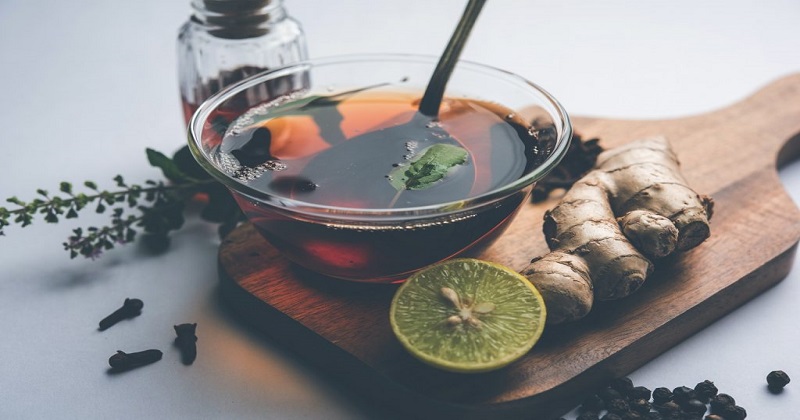
Tulsi is a plant native to the Indian subcontinent. Aside from its religious significance in India, the leaves of this plant are widely used. They are used with tea to alleviate coughs and colds. As the seasons change, tulsi is considered a natural immunity booster. As a queen of herbs, Tulsi has many health benefits. In addition to vitamins K, A, and C, tulsi leaves contain calcium, phosphorus, magnesium, zinc, and iron. Here are a few benefits of consuming Tulsi.
Managing stress
The stress we face each day affects our bodies, our minds, and our feelings, as well as our behavior. Keeping an eye on its symptoms is therefore crucial. Tulsi leaves are considered an ‘adaptogen’ in Ayurveda. In addition, studies suggest that tulsi helps the body maintain normal levels of the stress hormone, cortisol. Tulasi leaves can soothe nerves, regulate blood circulation, and fight free radicals produced during stress. It is recommended that you chew about 10-12 leaves every day.
Healthy skin, healthy you
There are many ways to use tulsi to cure skin and hair conditions, including eating the leaves, drinking the juice, or adding its paste to a face mask. When eaten raw, it also helps purify the blood and give the skin a healthy glow. Anti-bacterial and anti-fungal properties prevent breakouts, acne, and blemishes. Aside from all this, it helps to reduce the itchiness of the scalp and reduce hair loss. Blend a handful of tulsi leaves with some warm coconut oil. Apply this mixture to your scalp once a week to prevent hair loss.
Dental hygiene
Try brushing your teeth with some dried tulsi leaves powder every once in a while. As well as preventing bad breath, this practice prevents gum diseases, pyorrhea, and other dental infections. Mix the powder with a few drops of mustard oil for best results. Use this herb if you have a toothache. Using three to four fresh tulsi leaves, prepare a smooth paste. Mix in half a tablespoon of black peppercorn powder. Rub the paste directly onto the tooth. Continue doing this thrice a day to get permanent relief from pain.
Common cold and fever
This herb’s germicidal, fungicidal, antibacterial, and antibiotic properties help bring down a fever. It is also helpful to chew on some fresh tulsi leaves on an empty stomach to get rid of colds and flu. In a half-liter of water, boil 6-7 tulsi leaves with 1-2 teaspoons of powdered cardamom. Cook until the liquid is reduced by half. You can add honey or sugar to it if required, and sip it every two or three hours. Tulsi leaves are said to have the power to cure any fever, whether it’s due to an infection or malaria.
Goodbye, headache
The best natural cure for headaches is tulsi since it has pain-relieving and decongestant properties. If you are suffering from a headache caused by sinusitis, allergies, a cold, or even migraines, boil two cups of tulsi leaves in water and let it cool. A clean piece of cloth soaked in it can be gently placed on the forehead to relieve a headache. You can also add a few drops of tulsi oil or extract to the water. A paste made from ground basil leaves and sandalwood can also provide the benefits of its cooling effects. Just apply it to your forehead and relax.
Other uses of tulsi leaves
- Insect bites: Apply tulsi juice or tulsi root paste directly to the affected area.
- Sore throat: Gargle with tulsi leaves boiled in water. You can also drink it every few hours.
- Sore eyes: Boil some tulsi leaves to prepare juice. Boil until the water turns black. Put two drops into each eye at bedtime using a sterilized eyedropper.
- Burns: To lessen the pain, apply coconut oil mixed with tulsi juice directly to the burn with a cotton pad or clean cloth. Ensure the wound is not open.
- Itchiness: Combine equal amounts of tulsi juice and lemon juice for quick relief from itching. Simply apply to the affected areas and allow to dry naturally.

Here are some ways to use humble leaves to prepare healthy concoctions.
Tulsi water
Ingredients: Tulsi leaves and water
In a pan, add two cups of water. Add some tulsi leaves and bring the water to a boil until it has halved. Strain and have it warm. It will soothe throat soreness and pain.
Caffeine-free herbal tea
Ingredients: Tulsi leaves, jaggery, water, lemon juice
Blend jaggery and tulsi leaves. To this mixture, add one-and-a-half cups of water and lemon juice. Allow it to boil and then strain. Have it warm.
Tulsi herbal water
Ingredients: Ginger, black pepper, cloves, tulsi leaves, cinnamon, cardamom
Mix all the ingredients together and add water. Bring to a boil. Strain and you can have it warm or at room temperature. Increase your platelet count with herbal tulsi water to recover from dengue and malaria.
Herbal juice
Ingredients: Ajwain, tulsi leaves, cumin, amchoor powder, salt, and mint leaves
Add all the above ingredients to four cups of water. Boil for 15 to 20 minutes. Enjoy it warm or at room temperature. It helps to recover from dehydration.

Post Your Comments